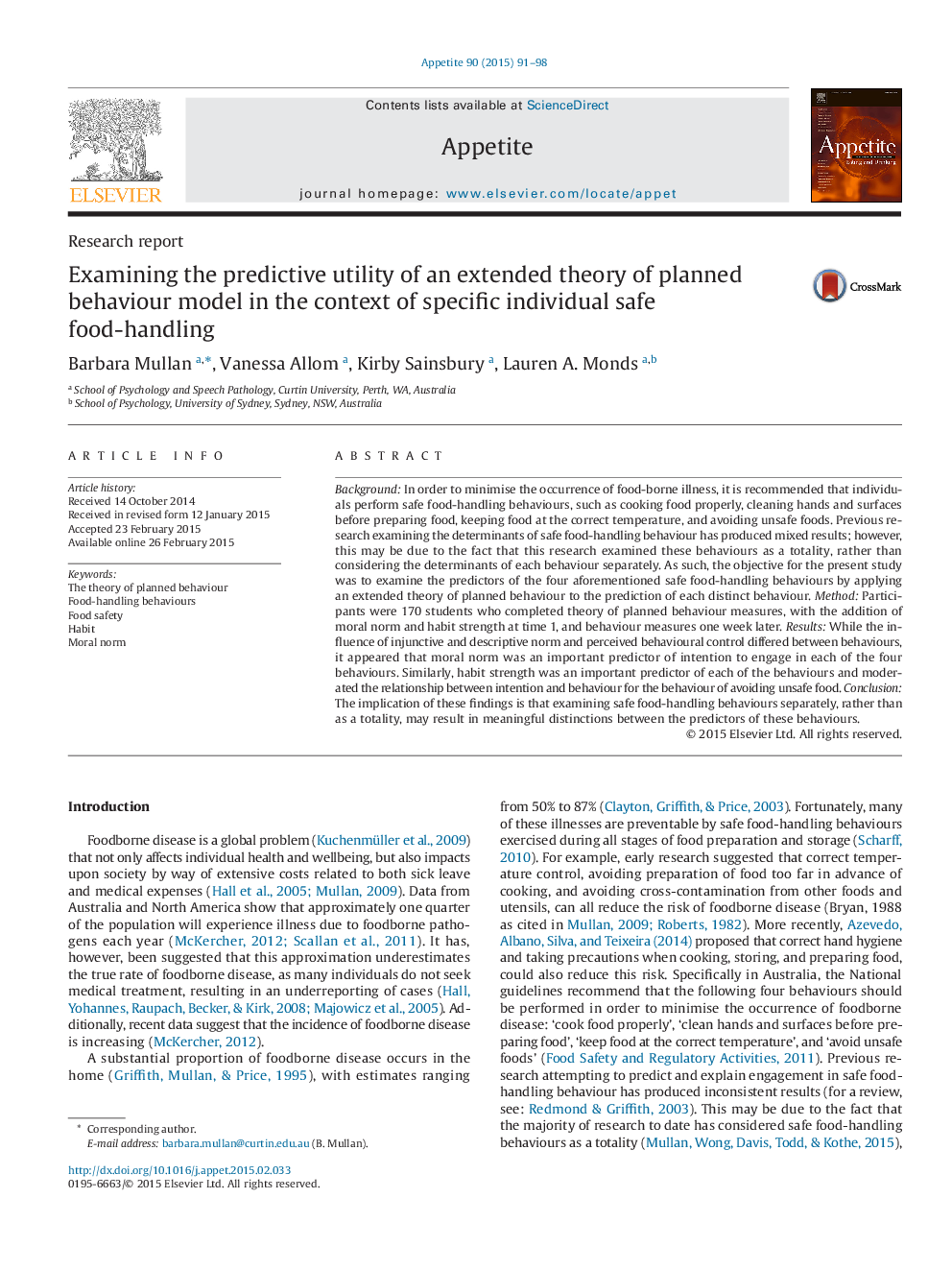| کد مقاله | کد نشریه | سال انتشار | مقاله انگلیسی | نسخه تمام متن |
|---|---|---|---|---|
| 7308802 | 1475390 | 2015 | 8 صفحه PDF | دانلود رایگان |
عنوان انگلیسی مقاله ISI
Examining the predictive utility of an extended theory of planned behaviour model in the context of specific individual safe food-handling
ترجمه فارسی عنوان
بررسی قابلیت پیش بینی تئوری گسترده ای از مدل رفتار برنامه ریزی شده در زمینه رفتار فرد با غذا با خصوصیات خاص
دانلود مقاله + سفارش ترجمه
دانلود مقاله ISI انگلیسی
رایگان برای ایرانیان
کلمات کلیدی
نظریه رفتار برنامه ریزی شده، رفتارهای تغذیه با غذا، ایمنی مواد غذایی، عادت، هنجار اخلاقی،
ترجمه چکیده
سابقه و هدف: برای به حداقل رساندن بیماری های غذایی منتقل می شود، توصیه می شود افراد رفتارهای سالم غذایی خود را مانند غذا درست کنند، قبل از آماده کردن غذا، آماده نگه داشتن غذا، نگه داشتن غذا در دمای مناسب و اجتناب از ناامن خوراکی ها. تحقیقات قبلی بررسی عوامل موثر در رفتار با غذا با غذا باعث نتایج متفاوتی می شود؛ با این حال ممکن است این امر به دلیل این واقعیت باشد که این تحقیق این رفتارها را به عنوان یک مجموع کامل بررسی کرده است، نه به طور جداگانه از عوامل تعیین کننده هر رفتار. به همین ترتیب، هدف مطالعه حاضر بررسی پیش بینی کننده رفتار چهار رفتار فوق العاده ایمن غذا با استفاده از تئوری گسترده ای از رفتار برنامه ریزی شده به پیش بینی هر رفتار متمایز بود. روش: شرکت کنندگان 170 دانش آموز بودند که تئوری اقدامات رفتاری برنامه ریزی شده را تکمیل کردند، با افزودن عادت اخلاقی و قدرت عادت در زمان 1 و رفتاری یک هفته بعد. یافته ها: در حالی که تأثیر هنجارهای پیش بینی کننده و توصیفی و کنترل رفتاری درک شده در بین رفتارها متفاوت بود، به نظر می رسد که اخلاق اخلاقی پیش بینی کننده مهمی برای قصد مشارکت در هر یک از چهار رفتار است. به طور مشابه، قدرت عادت پیش بینی کننده مهم هر یک از رفتارها بود و ارتباط بین قصد و رفتار را برای رفتار اجتناب از مواد غذایی ناامن را تعدیل کرد. نتیجه گیری: نتیجه این یافته ها این است که بررسی رفتارهای رفتار غذایی با غذا به طور جداگانه و نه به صورت کلی، می تواند منجر به تفاوت معنی داری بین پیش بینی کننده های این رفتارها شود.
موضوعات مرتبط
علوم زیستی و بیوفناوری
علوم کشاورزی و بیولوژیک
دانش تغذیه
چکیده انگلیسی
Background: In order to minimise the occurrence of food-borne illness, it is recommended that individuals perform safe food-handling behaviours, such as cooking food properly, cleaning hands and surfaces before preparing food, keeping food at the correct temperature, and avoiding unsafe foods. Previous research examining the determinants of safe food-handling behaviour has produced mixed results; however, this may be due to the fact that this research examined these behaviours as a totality, rather than considering the determinants of each behaviour separately. As such, the objective for the present study was to examine the predictors of the four aforementioned safe food-handling behaviours by applying an extended theory of planned behaviour to the prediction of each distinct behaviour. Method: Participants were 170 students who completed theory of planned behaviour measures, with the addition of moral norm and habit strength at time 1, and behaviour measures one week later. Results: While the influence of injunctive and descriptive norm and perceived behavioural control differed between behaviours, it appeared that moral norm was an important predictor of intention to engage in each of the four behaviours. Similarly, habit strength was an important predictor of each of the behaviours and moderated the relationship between intention and behaviour for the behaviour of avoiding unsafe food. Conclusion: The implication of these findings is that examining safe food-handling behaviours separately, rather than as a totality, may result in meaningful distinctions between the predictors of these behaviours.
ناشر
Database: Elsevier - ScienceDirect (ساینس دایرکت)
Journal: Appetite - Volume 90, 1 July 2015, Pages 91-98
Journal: Appetite - Volume 90, 1 July 2015, Pages 91-98
نویسندگان
Barbara Mullan, Vanessa Allom, Kirby Sainsbury, Lauren A. Monds,
